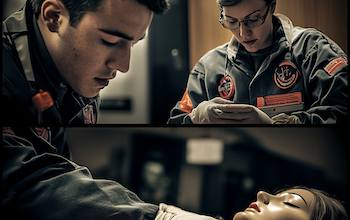
Mastering emergency medical skills is crucial in the fast-paced world of emergency medicine, where proficiency can mean the difference between life and death. The journey from novice to expert, though challenging, is highly rewarding, requiring continuous learning, practice, and dedication to provide the highest quality of care.
• Definition and characteristics of a novice in emergency medical skills.
• Initial training programs and certifications (e.g., BLS, ACLS).
• Common challenges faced by beginners.
• Tips for overcoming initial hurdles.
The journey in emergency medical skills begins with the novice stage. At this point, individuals are newly introduced to the field, often fresh out of their initial training programs. Characteristics of a novice include limited experience, high dependence on guidelines, and a need for close supervision. Initial training programs, such as Basic Life Support (BLS) and Advanced Cardiac Life Support (ACLS), provide the foundational knowledge necessary for beginners to start their practice.
Novices often face several challenges, such as anxiety during emergencies, difficulty in recalling procedures under pressure, and a lack of confidence. Overcoming these hurdles requires consistent practice and support from experienced mentors. Engaging in regular hands-on practice, attending workshops, and participating in simulation exercises can significantly improve their skills and confidence.
• Importance of hands-on practice and simulations.
• Role of mentorship and guidance from experienced professionals.
• Advanced training courses and certifications (e.g., PALS, Neonatal resuscitation).
• Case studies of intermediate proficiency: real-life examples.
As individuals move beyond the novice stage, they enter a period of skill development and intermediate proficiency. This phase is marked by increased confidence, better procedural memory, and improved decision-making skills. Hands-on practice and simulations play a crucial role in this development. By repeatedly performing medical procedures in a controlled environment, individuals can refine their techniques and build muscle memory.
Mentorship from experienced professionals is invaluable at this stage. Mentors provide guidance, share insights from their own experiences, and offer constructive feedback. Additionally, advanced training courses such as Pediatric Advanced Life Support (PALS) and Neonatal Resuscitation further enhance their expertise and prepare them for more complex scenarios.
Real-life examples and case studies illustrate the progress of individuals at this stage. For instance, an intermediate practitioner may handle a pediatric emergency with greater ease and efficiency compared to their novice self. These experiences reinforce the importance of continuous learning and application.
• Characteristics of an expert in emergency medical skills.
• Continuous education and staying updated with the latest guidelines (e.g., AHA updates).
• Participating in advanced simulations and real-life scenarios.
• The importance of teaching and mentoring others.
Achieving expertise in emergency medical skills is a significant milestone. Experts are characterized by their deep knowledge, quick decision-making abilities, and intuitive understanding of emergency procedures. They often serve as leaders in critical situations, guiding teams and making split-second decisions that can save lives.
Continuous education is essential for maintaining expertise. Keeping up with the latest guidelines from authoritative bodies like the American Heart Association (AHA) ensures that practices are based on the most current research. Participation in advanced simulations and real-life scenarios further sharpens an expert’s skills, preparing them for any situation they might encounter.
Teaching and mentoring others is a hallmark of true expertise. By sharing knowledge and experience with novices and intermediates, experts help to raise the overall competence of the medical community. This not only benefits individual practitioners but also improves patient outcomes across the board.
• Recommended tools and resources (e.g., MediCode, CertAlert+).
• Importance of self-assessment and regular practice.
• Using technology and apps for skill enhancement.
• Networking and joining professional organizations for ongoing support.
To maintain and enhance emergency medical skills, it’s crucial to utilize the right tools and resources. Apps like MediCode provide quick access to essential algorithms and procedures, ensuring that practitioners can reference critical information on the go. CertAlert+ helps in managing certifications, reminding professionals of renewal dates and keeping their qualifications up to date.
Regular self-assessment and practice are vital for continuous improvement. Practitioners should routinely evaluate their skills and identify areas for improvement. Technology plays a significant role here, with various apps and online platforms offering simulations and interactive learning modules to enhance proficiency.
Networking and joining professional organizations offer ongoing support and development opportunities. Being part of a community of like-minded professionals provides access to the latest research, trends, and best practices in emergency medical care. It also opens avenues for collaboration and mentorship, which are invaluable for professional growth.
• Balancing work-life and avoiding burnout in a demanding field.
• The role of mental health and wellness in professional development.
• Inspirational stories of professionals who have achieved expertise.
• Encouragement to continue striving for excellence.
Balancing work-life demands is essential in the high-stress field of emergency medical services. To avoid burnout, practitioners must prioritize their mental health and wellness. This involves regular self-care, seeking support when needed, and maintaining a healthy work-life balance.
Inspirational stories of professionals who have achieved expertise can serve as powerful motivators. These stories highlight the dedication, resilience, and continuous effort required to excel in the field. They also provide valuable lessons and insights for those on their journey from novice to expert.
Finally, it’s important to encourage all medical professionals to continue striving for excellence. The impact of expert emergency medical skills on patient outcomes and overall healthcare quality cannot be overstated. By committing to lifelong learning and improvement, practitioners ensure they can provide the best possible care to those in need.
• Recap of the journey from novice to expert.
• Final tips and motivation for readers to keep advancing their skills.
• The impact of expert emergency medical skills on patient outcomes and healthcare quality.
In conclusion, the journey from novice to expert in emergency medical skills is marked by continuous learning, practice, and dedication. Each stage of development brings new challenges and opportunities for growth. By embracing a commitment to excellence, medical professionals can significantly improve patient outcomes and contribute to the overall quality of healthcare.